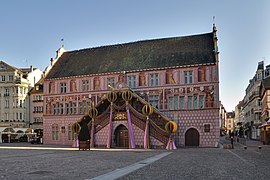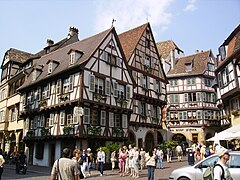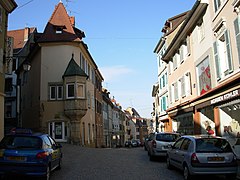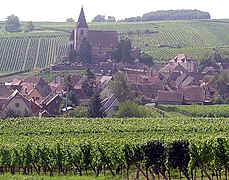Haut-Rhin
Haut-Rhin | |
|---|---|
![Prefecture]building of the Haut-Rhin department, in Colmar](/media/wikipedia/commons/thumb/d/db/Colmar_Prefecture.JPG/250px-Colmar_Prefecture.JPG) Prefecture building of the Haut-Rhin department, in Colmar | |
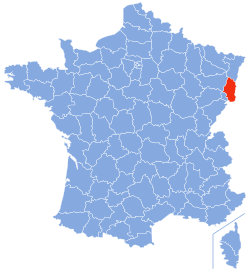 Location of Haut-Rhin in France | |
| Coordinates: 47°57′51″N 7°19′11″E / 47.96417°N 7.31972°E | |
| Country | France |
| Region | Grand Est |
| Département | 4 March 1790 |
| Prefecture | Colmar |
| Subprefectures | Altkirch, Mulhouse, Thann |
| Government | |
| • President | Brigitte Klinkert |
| Area | |
| • Total | 3,525.2 km2 (1,361.1 sq mi) |
| Population (2014)[3] | |
| • Total | 760,134 |
| • Density | 220/km2 (560/sq mi) |
| Demonym | Haut-Rhinois |
| Time zone | UTC+1 (CET) |
| • Summer (DST) | UTC+2 (CEST) |
| ISO 3166 code | FR-68 |
| Arrondissements | 4 |
| Cantons | 17 |
| Communes | 366 |
| Website | Haut-Rhin Council |
Haut-Rhin is a department in the Grand Est region of France. Its name means Upper Rhine. The Rhine river is Haut-Rhin's eastern border. The prefecture (capital) of Haut-Rhin is Colmar.
History
[change | change source]Haut-Rhin is one of the original 83 departments created during the French Revolution on 4 March 1790. It has three districts: Altkirch, Belfort and Colmar, with Colmar as is capital.[4]
In 1800, with the creation of the arrondissements in France, the three districts were changed into five arrondissements: Colmar, Altkirch, Belfort, Delémont and Porrentruy. The arrondissements Delémont and Porrentruy were eliminated in 1814 and transferred to Switzerland.[4]
The subprefecture of Altkirch was moved to Mulhouse in 1857.
The Haut-Rhin department was eliminated in 1871 when the territory became part of Germany except for a part that forms the Territoire de Belfort.
In 1919, Haut-Rhin is again an department when the territory became part of France with the arrondissements Colmar-Ville, Colmar-Campagne, Altkirch, Guebwiller, Mulhouse, Ribeauvillé and Thann. Its capital is Colmar.
The arrondissements Colmar-Ville and Colmar-Campagne were combined in 1934 to form the arrondissement of Colmar.[4]
In 2015, the arrondissements of Guebwiller and Ribeauvillé were eliminated and the name of the arrondissements of Thann and Colmar were changed to Thann-Guebwiller and Colmar-Ribeauvillé.
Geography
[change | change source]Haut-Rhin is the smaller and less populated of the two departments of the former administrative Alsace region. It is in the Grand Est region. It is next to 3 departments in 2 regionsː
- Grand Est region
- Bourgogne-Franche-Comté region
To the east, the Haut-Rhin is next to Germany along the Rhine river, and to the south it is next to Switzerland.
Haut-Rhin's area is 3,525.2 km2 (1,361 sq mi).[2] Its highest point is Grand Ballon (47°54′4″N 7°5′54″E / 47.90111°N 7.09833°E) in the Vosges Mountains, in the eastern part of the department; it is 1,424 m (4,672 ft) high.[5] The lowest point is 179 m (587 ft) high along the Rhine river.
The main river in the department is the Rhine that forms the eastern border of the department, and of France.
Climate
[change | change source]The area around Colmar, at an altitude of about 210 m (690 ft), few extremes of temperature. The Köppen climate classification type for the climate at Strasbourg is a "Marine West Coast Climate" and of the subtype "Cfb".[6]
The average amount of precipitation for the year in Strasbourg is 594.4 mm (23.4 in). The month with the most precipitation on average is June with 71.1 mm (2.8 in) of precipitation. The month with the least precipitation on average is February with an average of 33 mm (1.3 in).
The average temperature for the year in Strasbourg is 10 °C (50 °F). The warmest month, on average, is July with an average temperature of 18.9 °C (66.0 °F). The coolest month on average is January, with an average temperature of 1.1 °C (34.0 °F).
Administration
[change | change source]Haut-Rhin is managed by the Departmental Council of Haut-Rhin in Colmar. The department is part of the Grand Est region.
Administrative divisions
[change | change source]There are 4 arrondissements (districts), 17 cantons and 366 communes (municipalities) in Haut-Rhin.[7]
| INSEE code |
Arrondissement | Capital | Population[8] (2014) |
Area[9] (km²) |
Density (Inh./km²) |
Communes |
|---|---|---|---|---|---|---|
| 681 | Altkirch | Altkirch | 69,645 | 663.1 | 105.0 | 108 |
| 682 | Colmar-Ribeauvillé | Colmar | 200,243 | 1,127.3 | 177.6 | 98 |
| 684 | Mulhouse | Mulhouse | 350,032 | 707.1 | 495.0 | 79 |
| 686 | Thann-Guebwiller | Thann | 140,214 | 1,027.7 | 136.4 | 81 |
The following is a list of the 17 cantons of the Haut-Rhin department (with their INSEE codes), following the French canton reorganisation which came into effect in March 2015:[10]
- Altkirch (6801)
- Brunstatt (6802)
- Cernay (6803)
- Colmar-1 (6804)
- Colmar-2 (6805)
- Ensisheim (6806)
- Guebwiller (6807)
- Kingersheim (6808)
- Masevaux (6809)
- Mulhouse-1 (6810)
- Mulhouse-2 (6811)
- Mulhouse-3 (6812)
- Rixheim (6813)
- Saint-Louis (6814)
- Sainte-Marie-aux-Mines (6815)
- Wintzenheim (6816)
- Wittenheim (6817)
People
[change | change source]The people in the Haut-Rhin department are known, in French, as Haut-Rhinois or (women: Haut-Rhinoises),[11]
Haut-Rhin had a population, in 2014, of 760,134,[3] for a population density of 215.6 inhabitants/km2. The arrondissement of Mulhouse, with 350,032 inhabitants, is the arrondissement with more inhabitants.[9]
Evolution of the population in Haut-Rhin

The 10 communes with more inhabitants in the Haut-Rhin department are:
| City | Population[8] (2014) |
Arrondissement |
|---|---|---|
| Mulhouse | 111,167 | Mulhouse |
| Colmar | 68,784 | Colmar-Ribeauvillé |
| Saint-Louis | 20,228 | Mulhouse |
| Wittenheim | 14,713 | Mulhouse |
| Illzach | 14,448 | Mulhouse |
| Rixheim | 13,773 | Mulhouse |
| Kingersheim | 12,918 | Mulhouse |
| Riedisheim | 12,102 | Mulhouse |
| Cernay | 11,723 | Thann-Guebwiller |
| Guebwiller | 11,297 | Thann-Guebwiller |
Gallery
[change | change source]Related pages
[change | change source]References
[change | change source]- ↑ "Vos élus" (in French). Conseil départamental du Haut-Rhin. Archived from the original on 12 June 2017. Retrieved 14 December 2017.
- ↑ 2.0 2.1 "Département du Haut-Rhin (68)". Comparateur de territoire (in French). Institut national de la statistique et des études économiques - INSEE. Retrieved 14 December 2017.
- ↑ 3.0 3.1 "Populations légales 2014 des départements et des collectivités d'outre-mer" (in French). Institut national de la statistique et des études économiques - INSEE. Retrieved 14 December 2017.
- ↑ 4.0 4.1 4.2 "Historique du Haut-Rhin". Le SPLAF (in French). Retrieved 13 December 2017.
- ↑ "Grand Ballon, France". Peakbagger.com. Retrieved 14 December 2017.
- ↑ "Colmar, France - Köppen Climate Classification". Weatherbase. Retrieved 14 December 2017.
- ↑ "Département du Haut-Rhin (68)" (in French). Institut national de la statistique et des études économiques - INSEE. Retrieved 14 December 2017.
- ↑ 8.0 8.1 "Régions, départements, arrondissements, cantons et communes" (PDF). Populations légales 2014 (in French). Institut national de la statistique et des études économiques - INSEE. Retrieved 14 December 2017.
- ↑ 9.0 9.1 "Département du Haut-Rhin (67) et Arrondissements". Comparateur de territoire (in French). Institut national de la statistique et des études économiques - INSEE. Retrieved 14 December 2017.
- ↑ "Décret n° 2014-207 du 21 février 2014 portant délimitation des cantons dans le département du Haut-Rhin" (in French). Légifrance.gouv.fr. Retrieved 14 December 2017.
- ↑ "Habitants du départment: Haut-Rhin" (in French). habitants.fr. Retrieved 14 December 2017.
Other websites
[change | change source]- Departmental Council website Archived 2018-01-17 at the Wayback Machine (in French)
- Prefecture of the Haut-Rhin department (in French)



